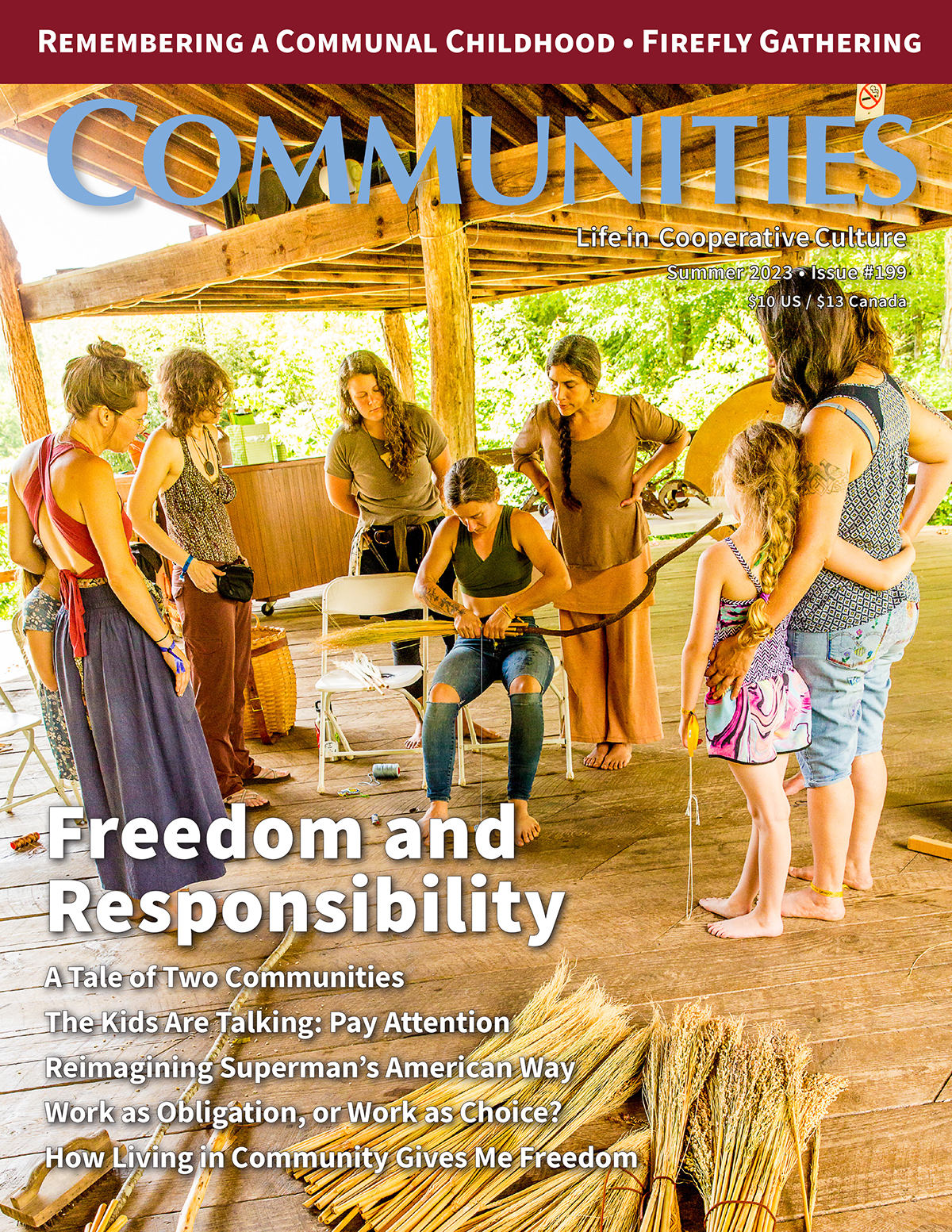
Communities #199
Summer 2023
Note: You can order a copy of this issue here.
Communities #199 explores different ways of balancing Freedom and Responsibility in community. Authors describe a wide range of approaches to community participation, money, childrearing, individuality, and interdependence, tracing personal stories that suggest expanded understandings of both freedom and responsibility. Several parents and grown community children recount formative years spent in intentional communities with sometimes sharply contrasting cultures and ways of balancing autonomy and group-orientation. Six-plus decades of personal communal experiences combine with larger historical perspectives in what we believe to be a fascinating issue—we hope you’ll agree!
Welcome New Worldwide Readers; Seeking and Finding; Communal Studies Association: An Invitation
Notes from the Editor: Matching Freedom with Responsibility by Chris Roth
Freedom and Responsibility are perpetual dance partners. We sideline either of them only at our peril.
How Living in Community Gives Me Freedom by Rachel Freifelder
Independence is itself an illusion. At Blueberry, relying on each other means less need to rely on money and petroleum. And for us, that’s freedom.
A Tale of Two Communities: Contrasting Freedoms and Responsibilities by Dena Smith Ellis
Looking back, I now realise that I had stepped out of the pan and into the fire. The community and people had changed but the human dynamics were the same.
The Firefly Gathering: Learning to Live Well with the Earth and One Another by Marissa Percoco
In all things, personal autonomy is in the balance with the greatest good for the community. There are no absolute rules, or single right answers.
Reimagining Superman’s American Way by Alan O’Hashi
Becoming a cohouser isn’t just a choice to live in a new home but also an unsettling rebirth and viewing the world through a different lens.
My Way vs. Our Way: A New Take on Freedom by Dirk Muller
I experience the greatest freedom and happiness when doing things in a unified spirit with the community, rather than being so-called “free” to do whatever I want.
Work as Obligation, or Work as Choice? by Sylvan Bonin
At Songaia, we don’t have required work hours or required participation from residents. How does everything happen? The Passion Principle, what I would call mutuality or anarchy.
Voluntary Community Participation? by Ed Sutton, Kathleen Lowry, Joyce Cheney, Bonnie Fergusson, Anonymous, Lisa Kuntz, Liz Magill, Samantha Embrey, David Heimann, Sharon Villines, and Denise Tennen
Can cohousing communities operate successfully with laissez-faire resident participation?
Participation Is a Right and a Responsibility by Graham Ellis
The negative example of Bellyacres shows that finding a reasonable balance in participation, at levels tolerable for all involved, is essential to healthy community.
Agreements and Individuality, The Farm’s “Multistery,” and My Shotgun Wedding by Martin Holsinger
Despite our experiment in minimizing how people can express their individuality through their appearance, and other shared commitments, we had no problem telling each other apart.
The Kids Are Talking: Pay Attention—Remembering a Communal Childhood by Dana Gaskin Wenig
While both my parents created intentional communities, they did it in two different flavors: my mom and her friends in back-to-the-land; my father and his students in psychedelic hippie. I learned so much from both—including the drawbacks of a countercultural childhood, and maladaptive habits I am still unlearning. Still I wouldn’t trade any of it for a white picket fence.
Children of Utopia: Freedom’s Toll by Understanding Israel
As high rates of serious mental illness among grown children of the Love Israel Family demonstrate, avoiding parental responsibilities by hoping the larger collective will raise one’s children has tragic consequences.
Too Much of a Good Thing: Small-Group versus Large-Group Communal Childcare by A. Allen Butcher
Ironically, after turning away from the social design of the nuclear family to create a communal society, most communalists abandon communal sharing once they have children. The answer may be small-scale “cofamily,” the current state-of-the-art of childraising in communal society.
REACH
The Buck Stops Where? Starting and Stopping an Ecovillage, Part Two: Money by Dan Antonioli
How will money impact your experience of “freedom”? Will it empower you to be free or tie you down with the burden of “responsibility”?
ON THE COVER: The Firefly Gathering convenes more than 1,000 people every June near Asheville, North Carolina to learn and practice earthskills and experience community (see fireflygathering.org). Here, Emily Bell leads a broom-making workshop. She has written, “What if our most menial tasks become our most potent rituals?” (see gen-us.net/firefly). Photo by Sarah Tew.
